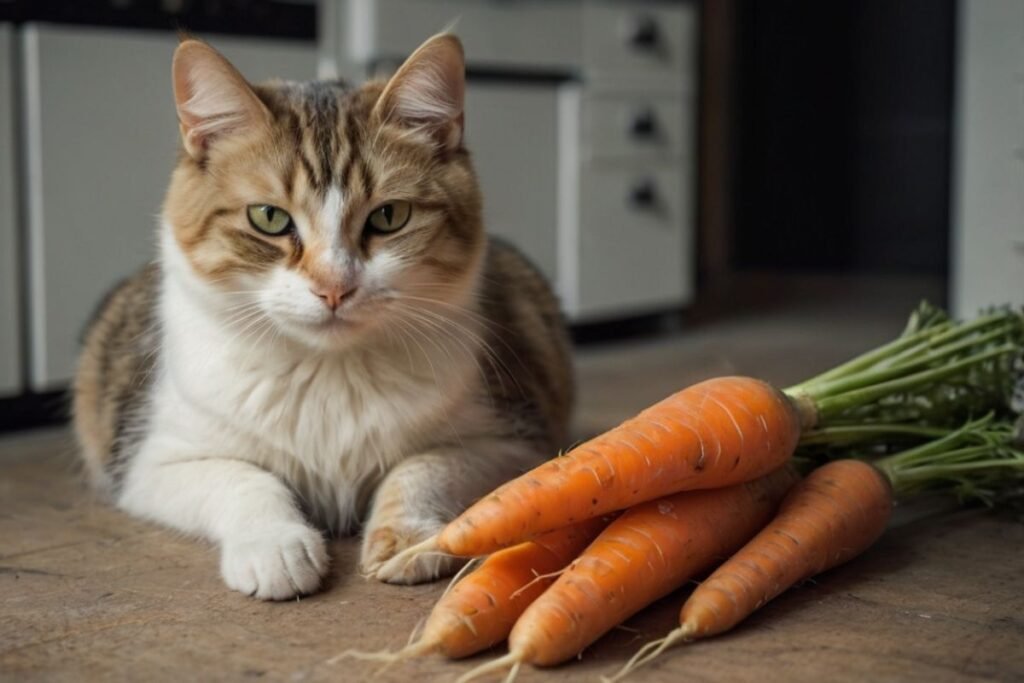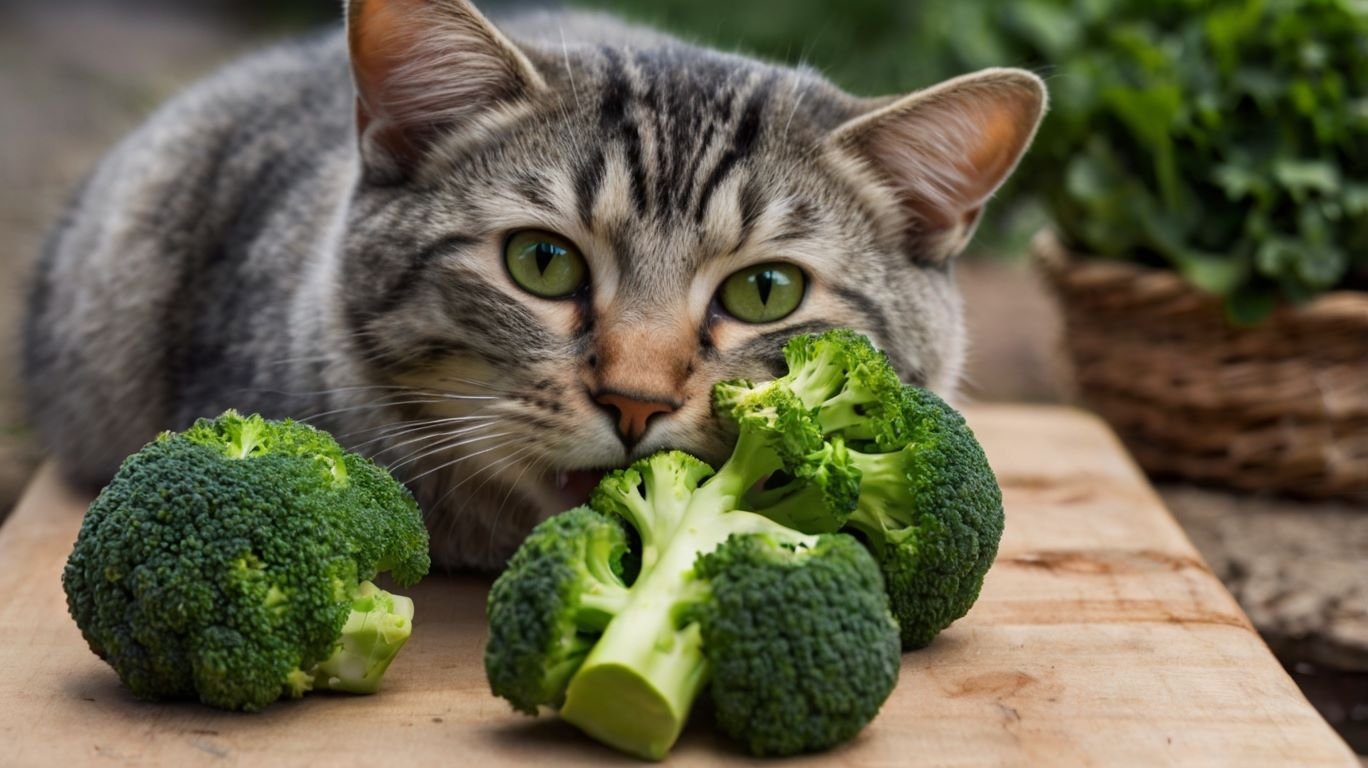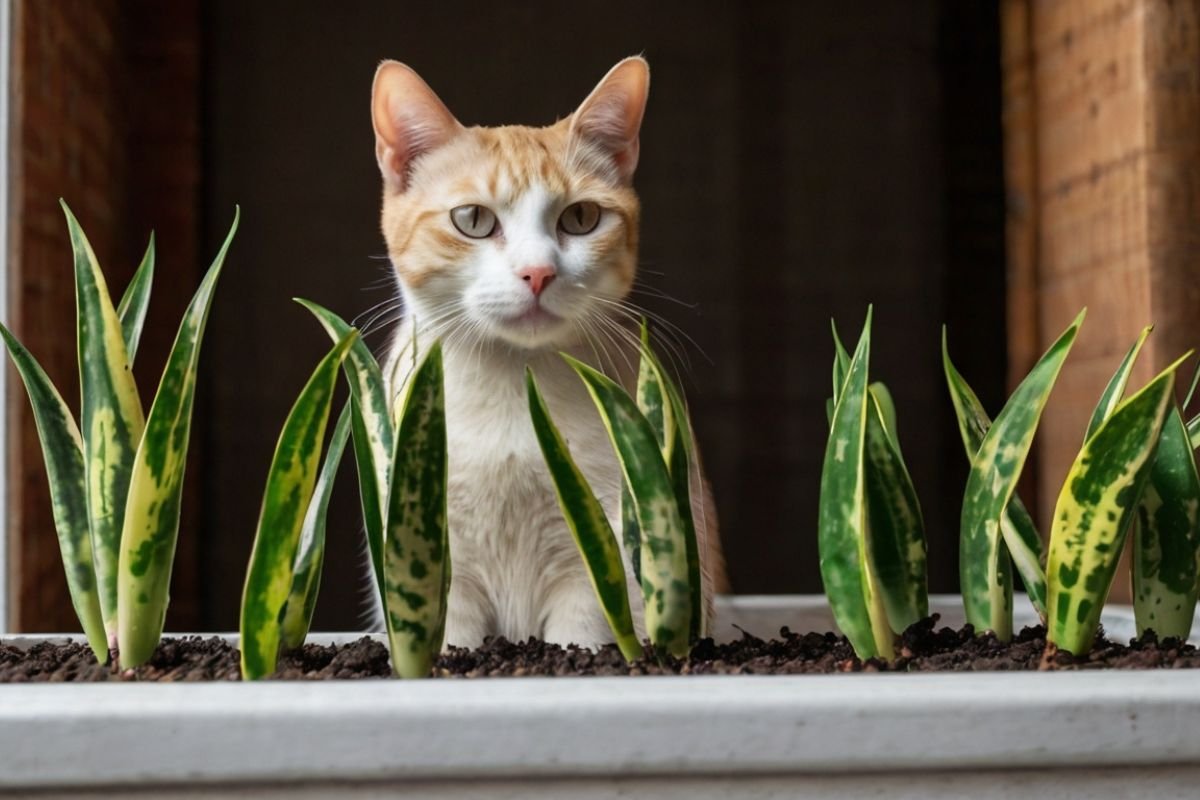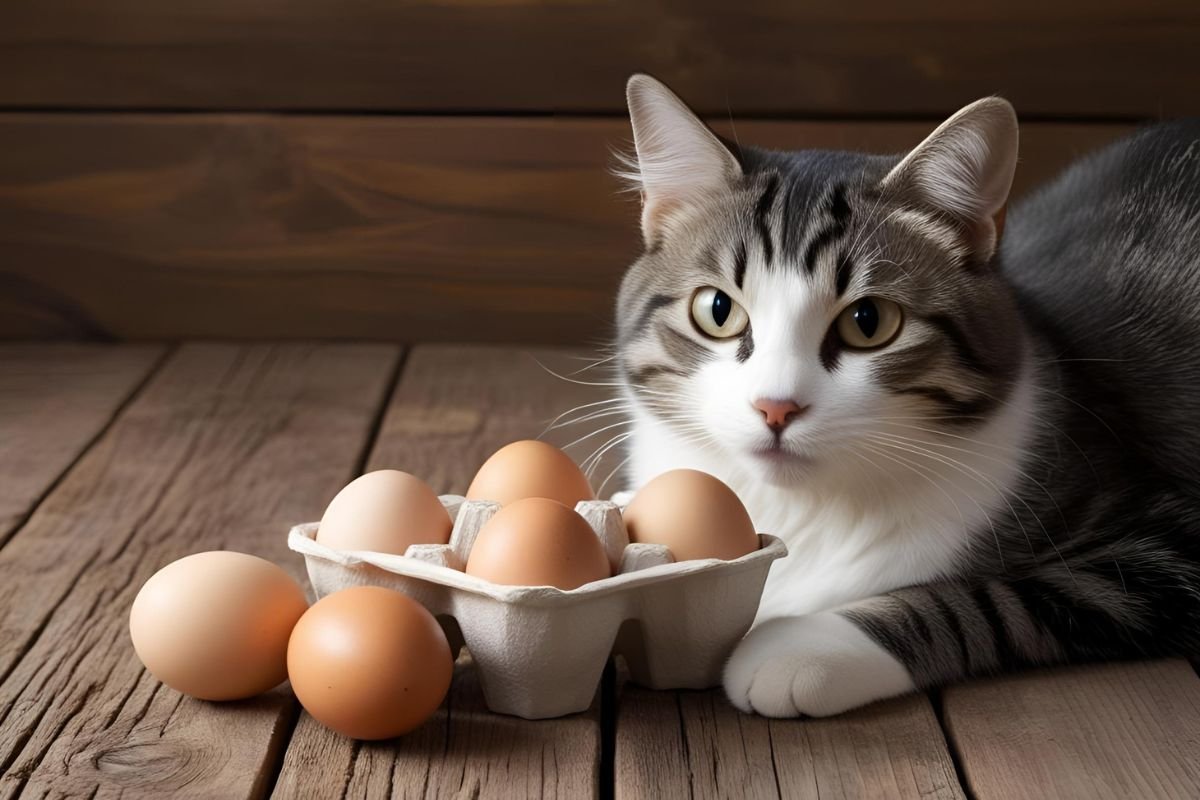You know those moments when your cat stares at you with those big, curious eyes while you’re enjoying a snack? That’s exactly what happened last Tuesday evening. There I was, chopping carrots for dinner, when my orange fluffball Rio hopped onto the counter (yes, I know he shouldn’t be up there!) and started batting at a carrot stick like it was the most fascinating toy he’d ever seen.
“Rio, can you even eat these?” I wondered aloud. His little pink nose twitched in response, and I found myself genuinely curious – can our feline friends safely enjoy carrots? Or was I about to unwittingly offer him something that might upset his tummy?
If you’ve ever caught yourself in a similar moment of cat-parent uncertainty, pull up a chair and let’s chat about it! I’ve gone down the rabbit hole (or should I say carrot hole?) researching this very question, and I’m excited to share what I’ve learned with you.

Table of Contents
The Friendly Truth: Yes, They Can!
Good news, fellow cat lover! Cats CAN eat carrots safely. They aren’t on the “dangerous foods” list that makes us pet parents break into a cold sweat. But – and this is a big but – just because they can doesn’t mean carrots should become a major part of their dinner menu.
You see, our beloved furballs are what experts call “obligate carnivores.” In plain English? They’re meat eaters through and through. Their bodies are designed to thrive on animal protein, not plant matter. It’s not just a preference – it’s how they’re built!
Also read, Can Cats Eat Popcorn?
Let’s Get Personal: Understanding Your Cat’s Inner Tiger
I often look at Rio when he’s intensely focused on a bird outside the window and think about how close to their wild roots our domestic cats really are. Those whiskers twitching, pupils dilating – he’s channeling his inner tiger!
Wild cats don’t forage for root vegetables or munch on garden greens. They hunt prey like mice, birds, and other small critters. Their bodies have evolved over thousands of years to process and extract nutrients from meat – not plants.
Think about your own cat’s little quirks and habits. Those sharp teeth? Made for tearing meat. That rough tongue? Perfect for stripping flesh from bones. Their short digestive tract? Designed to process animal protein quickly before bacteria can grow. Even their taste buds are different from ours – they can’t even detect sweet flavors! Mother Nature really created the perfect little carnivore.
Rio reminds me of this reality whenever I open a can of tuna. Suddenly, my usually dignified cat transforms into a meowing, circling ball of excitement. His body knows what it needs!
Carrots: What’s Really in Them for Your Cat?
So what about these orange crunchy veggies? Let’s have a heart-to-heart about what carrots actually offer our feline friends.
Carrots are packed with good stuff like:
- Beta-carotene (that’s what gives them that bright orange color!)
- Vitamin A
- Vitamin K
- Potassium
- Fiber
- Antioxidants
- Lots of water
Sounds great, right? Well, here’s where it gets interesting. Our cats’ bodies work differently than ours. Take beta-carotene, for instance. Our human bodies can convert it to vitamin A pretty efficiently. But our cats? Not so much. They need pre-formed vitamin A from animal sources to really benefit from it.
It’s like giving someone foreign currency they can’t easily exchange – technically valuable, but not particularly useful to them!
The Bright Side: When Carrots Can Actually Help Your Cat
Even though cats aren’t natural veggie lovers, carrots can still offer some genuine benefits when given in tiny amounts. Let me share what I’ve discovered:
A Natural Tooth Brush?
Last month, I gave Rio a small piece of raw carrot, and watching him crunch away was adorable! That crunching isn’t just cute – it can actually help clean his teeth. The firm texture works against plaque as they chew. Not a replacement for proper dental care, mind you, but a little bonus!
Keeping Things Moving Along…
Between you and me, Rio has had his share of… shall we say… “slow days” in the litter box department. A tiny bit of fiber from carrots can sometimes help keep things moving smoothly. Just one of those little tricks we pet parents learn over time!
Hydration Help
Does your cat turn up their nose at their water bowl? Mine too! Carrots have lots of water in them, so they can add a little extra hydration to your kitty’s day. Every little bit helps, especially for those cats who seem to think water bowls are just for paw-dipping!
Waistline Friendly
Let’s be honest – many of us are guilty of over-treating our cats. Those pleading eyes are hard to resist! Small bits of carrot can satisfy their curious nature without adding lots of calories. Rio has a bit of a treat belly that I’m trying to help him slim down, so this has been helpful for us.
Mental Adventure
Cats get bored easily (as our curtains and furniture often learn the hard way). New tastes and textures can be mentally stimulating for them. I swear Rio looked genuinely surprised by his first carrot experience – that tilted head and confused expression was priceless!
The Friendly Warning: Proceed with Caution
Before you start sharing your veggie platter with your furry friend, let’s talk about some genuine concerns. Think of me as that friend who wants you to have all the information before you dive in:
Choking Hazards Are Real
Raw carrots are hard! They can be difficult for little cat mouths to manage safely. Rio once got a piece that was too big, and my heart nearly stopped when he started coughing. Always cut them into tiny, tiny pieces – think smaller than a pea.
Tummy Troubles
Our cats have sensitive digestive systems. Too much of any new food – especially plant matter – can lead to upset tummies. Trust me, neither you nor your cat wants to deal with unexpected diarrhea at 3 AM. Been there, cleaned that!
Balance is Everything
The biggest worry isn’t that carrots are harmful – it’s that they might displace the truly nutritious foods your cat needs. Imagine filling up on bread before a meal – you might miss out on proteins and vegetables your body needs. Same concept applies to your kitty!
Sugar Content – Yes, Really!
Surprised? I was too! Carrots actually contain natural sugars. While not a huge deal in tiny amounts, too much sugar isn’t good for our feline friends and could potentially contribute to weight issues or even diabetes over time. Something to keep in mind, especially if your cat already has health concerns.
Let’s Get Practical: How to Share Carrots Safely
If you’re still with me and thinking about letting your curious cat try some carrot, let me share some friendly advice from one cat parent to another:
The Raw vs. Cooked Debate
Both options can work, but there are trade-offs:
Raw carrots have that satisfying crunch that helps clean teeth, but they’re harder for cats to digest and could be a choking risk.
Cooked carrots are softer and gentler on the digestive system, but lose some of the dental benefits.
In our house, Rio seems to prefer slightly steamed carrots – still with a bit of firmness but not rock-hard. It took some experimenting to find what he liked best!
My Personal Prep Method
Here’s my step-by-step approach when I prepare carrots for Rio:
- I give them a thorough wash first (even organic ones!)
- I always peel them to remove any lingering pesticides
- I cut them into the tiniest pieces you can imagine
- If I’m cooking them, I never add salt, butter, or spices
- I always let them cool completely before offering them
Size Matters – A Lot
When it comes to serving size, here’s what has worked well for us:
- First taste test: Literally just a tiny crumb
- Regular serving: No more than a small pinch (about 1/4 teaspoon)
- How often: Once a week at most
Remember, treats should make up less than 10% of your cat’s total food intake. I know those begging eyes make it tempting to give more, but stay strong!
When to Skip the Carrots Altogether
Let’s have some real talk. There are times when carrots just aren’t a good idea for your particular cat:
- If they show any signs of allergic reactions (Rio’s cousin had itchy ears after trying carrots!)
- If they consistently get digestive upset afterward
- If they have certain health conditions like diabetes
- If they simply turn up their nose at them
Never force it! Cats know what they like, and they’re not shy about their opinions. Rio makes his preferences crystal clear – he’ll eat the tiniest bit of carrot but turns his nose up at cucumber completely.
Beyond Carrots: Other Kitchen Staples Your Cat Might Enjoy
If your cat isn’t impressed by carrots or you want to mix things up, here are some other safe options from my kitchen that have gotten the occasional purr of approval:
- Cucumber slices: These have even more water and fewer calories than carrots
- Tiny bits of steamed broccoli: Rio bats these around before eating them!
- Cooked green beans: High in fiber and fun texture
- Plain cooked pumpkin: Great for digestion issues
- A few cooked peas: Small and easy to eat
Last summer during a heatwave, I made Rio a little “cooling salad” with tiny bits of chilled cucumber and carrot. He licked the cucumber and played with the carrots – not exactly a ringing endorsement, but he seemed to enjoy the experience!
Heart to Heart: What Your Cat Really Needs
While we’re chatting about carrots and treats, I’d be remiss if I didn’t talk about what really makes our feline friends thrive. As much as I love sharing new experiences with Rio, I know his health depends on getting the right nutrition.
The Real Deal on Cat Nutrition
Our cats’ bodies are amazing machines designed for a very specific fuel:
- Protein, protein, protein! From animal sources, not plants
- Certain animal fats their bodies can process efficiently
- Very few carbohydrates (they don’t need them like we do)
- Plenty of moisture in their food
- Specific vitamins and minerals in forms their bodies can use
- Taurine – an essential amino acid they can’t make themselves
When I think about it, it’s amazing how specialized their little bodies are!
The Food Bowl Reality Check
I’ll be the first to admit that feeding pets can get complicated. There are so many options, opinions, and price points to consider.
After lots of research and conversations with Rio’s vet, I’ve settled on a high-quality wet food as the foundation of his diet. It gives him the moisture and protein he needs in the right forms. The occasional treats – including those tiny carrot bits – are just extras, not replacements.
If you make your cat’s food at home (you amazing, dedicated pet parent!), please check in with a vet nutritionist to make sure you’re hitting all their nutritional needs. It’s trickier than it seems!
Water, Water Everywhere
Can I share something that revolutionized Rio’s drinking habits? Moving his water bowl AWAY from his food dish! Apparently, many cats instinctively avoid water near their food (something about contamination in the wild). When I put bowls in different rooms, his water intake noticeably improved.
Cats need plenty of water, but many don’t drink enough naturally. It’s one of those quirky cat things that makes them simultaneously fascinating and frustrating!
Stories from the Cat Community: We’re All in This Together
I love swapping stories with other cat parents – we learn so much from each other! Here are some experiences other cat lovers have shared with me about their carrot adventures:
Sarah told me: “My Mittens goes absolutely wild for carrot puree! Just a tiny dot mixed into her wet food, and she acts like I’ve given her a gourmet meal. Cats are so weird and wonderful!”
Marcus laughed when he shared: “My three cats had completely different reactions. Jasper batted his carrot piece around the kitchen for 20 minutes before eating it. Luna sniffed it and walked away offended. And Oreo? He stole his siblings’ pieces when they weren’t looking!”
Lisa, who cares for a senior cat, offered this wisdom: “For older cats with dental issues, try very soft-steamed and mashed carrot in tiny amounts. My 17-year-old enjoys this texture much more than harder foods these days.”
Aren’t cat personalities amazing? No two are exactly alike!
Questions I Hear All the Time

“Can my kitten try carrots too?”
I’d wait until they’re fully grown. Kittens have super specific nutritional needs for proper development. Focus on kitten-formulated foods until they’re adults, then you can experiment with tiny tastes of safe treats.
“What about those carrot tops?”
The leafy green parts aren’t toxic, but they’re even harder for cats to digest than the orange root. My vote? Skip them or use them in your own salad instead!
“How can I tell if my cat even likes carrots?”
Cats are expressive creatures! Try offering a tiny piece and watch their reaction. Some will be curious, others indifferent. Rio sniffs new foods thoroughly, takes a small taste, then either eats more or walks away. Trust their judgment!
“Is carrot juice OK for cats?”
I wouldn’t recommend it. It concentrates the sugars without the fiber benefits. Plus, most cats don’t need or want to drink anything besides water.
“Help! My cat stole a big piece of carrot. Should I panic?”
Deep breath! One larger piece is usually not cause for alarm. Just keep an eye out for any choking, difficulty swallowing, or digestive upset over the next day. If anything seems off, give your vet a call.
“Are baby carrots better than regular carrots for cats?”
They’re essentially the same nutritionally. The key is how you prepare them – tiny pieces, properly washed, and appropriate for your individual cat’s needs.
From My Home to Yours: Final Thoughts
As I wrap up our chat, I’m looking over at Rio, who’s currently sprawled across my keyboard (making typing this quite challenging!). He reminds me daily that while nutrition is important, so is joy, curiosity, and new experiences.
Carrots can be a safe, occasional treat for most cats, but they should always remain just that – an occasional treat. Your cat’s main diet should center around the meat-based nutrition their bodies are designed to process.
Rio enjoys his tiny carrot treats from time to time, but what he enjoys most is the attention and interaction that comes with them. Maybe that’s the real benefit – those special moments of connection we share with our furry family members.
Remember, every cat is a unique individual with their own quirks, preferences, and dietary needs. What Rio enjoys might not appeal to your feline friend at all – and that’s perfectly OK! The joy of being a cat parent is getting to know your particular kitty’s personality.
Have you ever shared carrots with your cat? I’d love to hear your stories in the comments below! We’re all in this cat-parenting journey together, learning as we go.

Shahriar Robin is the creator of WhatPetsCanEat.com, a passionate pet lover and dedicated cat dad to Rio, a curious two-year-old orange feline who inspired this website. With a love for animals and a knack for research, Shahriar shares trusted, easy-to-understand information to help fellow pet owners make safe, healthy food choices for their furry friends.


